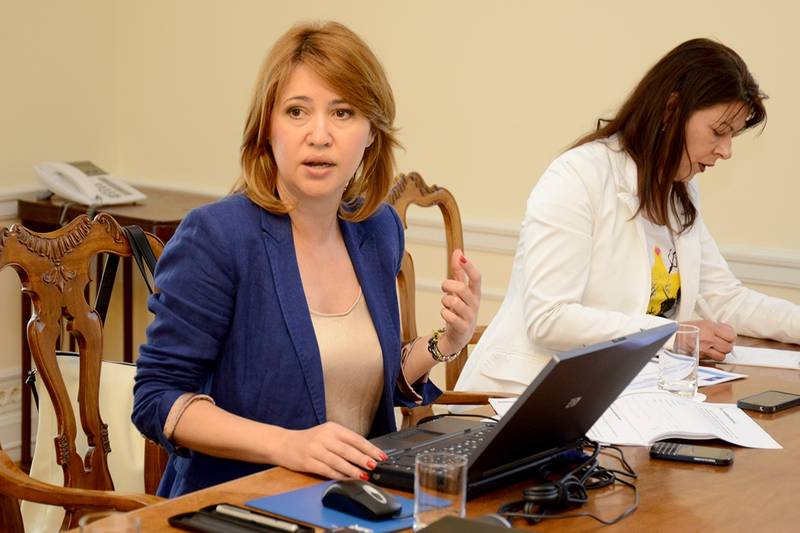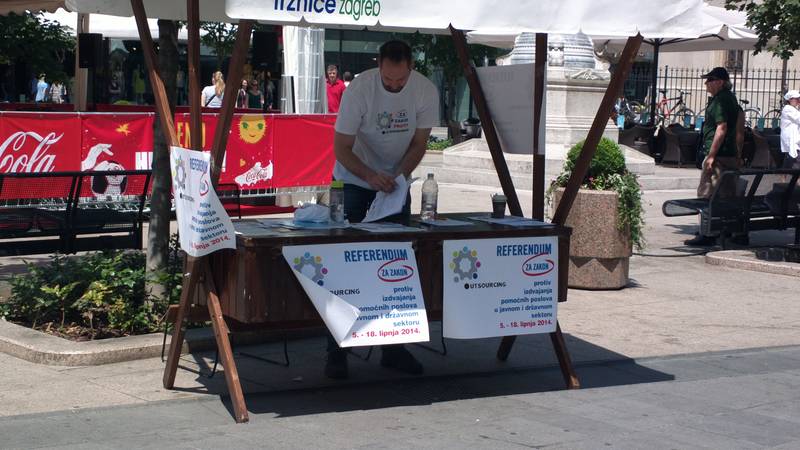Trade Unions Are again Blocking Reforms in Croatia
Adelina Marini, June 18, 2014
 One of the nine key reforms announced by the Croatian government with the aim to reduce the budget deficit after the European Commission launched an excessive deficit procedure against the country, will not be implemented. Under pressure from trade unions, the government has given up the plan to outsource some housekeeping services to the private sector. This has happened only days after the Commission published a devastating analysis of the condition of the Croatian economic and public sector. The reforms that were announced on December 30th last year, were inspired precisely by the Commission's decision to launch an excessive deficit procedure against Croatia.
One of the nine key reforms announced by the Croatian government with the aim to reduce the budget deficit after the European Commission launched an excessive deficit procedure against the country, will not be implemented. Under pressure from trade unions, the government has given up the plan to outsource some housekeeping services to the private sector. This has happened only days after the Commission published a devastating analysis of the condition of the Croatian economic and public sector. The reforms that were announced on December 30th last year, were inspired precisely by the Commission's decision to launch an excessive deficit procedure against Croatia.
Outsourcing housekeeping services was in the company of several other very important reforms such as the master plan for reorganisation of hospitals, restructuring of the schooling system and reorganisation of the judiciary aimed at acceleration of processing of cases. According to Croatian media, outsourcing would affect more than 20 000 employers in the public sector. Those are cleaners, launderers, cooks, housekeepers and other low-skilled personnel who are paid from the state budget and whose labour contracts are subject to collective bargaining. Recently, the outsourcing law was sent to Parliament for approval which provoked 17 trade unions to begin collecting signatures for a referendum against the outsourcing of services.
In only 11 days, more than 305 000 signatures were collected. They need to be a bit less than 400 000 to trigger the referendum procedure. Zeljko Stipic, coordinator of the initiative for collection of signatures, was convinced, however, that they will collect some 500 000 signatures [by the time this article was translated they actually did]. A day after the news conference where he announced the number of already collected signatures, the government said that it had chosen an outsourcing model "spin-off" which envisages founding a mega state-owned company where all these housekeeping services will be transferred to. This, practically, means milling the wind and in no way does it alleviate the state budget nor does it make the administration more efficient.
But even this option is rejected by the trade unions. Zeljko Stipic said it quite directly that the only thing the government needed to do was ... do nothing and maintain the situation as it is. In other words, no reforms. The trade unions, however, are silent on the issue where will the money come from for supporting the living of over 20 thousand people, whose activities can be taken by private companies. The unions have continued collecting signatures and insist on a referendum. If it takes place, this will be the third direct voting in the past two years after the Croats voted for their country's accession in the EU and for amendments to the Constitution which should explicitly state that marriage is a union only between a man and a woman.
In the introduction to the eight specific recommendations, the European Commission recalls that on June 21st, 2013, the Council of the EU welcomed Croatia's economic programme, underscoring that the country is expected to show progress in implementing the requirements of the Stability and Growth Pact (which sets limits to pubic debt and budget deficit) and that Zagreb has to invest a serious effort to consolidate public finances by in the same time keeping expenditures directed to bossting growth. Can  keeping low-skilled services under the budget be described as a growth boosting measure is a question the 17 trade unions that demand a referendum need to answer.
keeping low-skilled services under the budget be described as a growth boosting measure is a question the 17 trade unions that demand a referendum need to answer.
On December 20th, 2013, the European Council endorsed the priorities for financial stability, fiscal consolidation and actions to boost growth. Then, the leaders underscored the need to pursue differentiated and growth-sparing fiscal consolidation, restoring normal lending conditions for the economy, boosting growth and competitiveness, fighting unemployment and the social consequences from the crisis. Last but not least, the leaders, among them Croatia's PM too, agreed also for modernisation of the public administrations of their countries. These are, in fact, the European Commission's five guidelines in this year's annual growth survey.
Croatian trade unions are right to be afraid that outsourcing of services will lead to the loss of several thousand public jobs. On the other hand, however, this will create conditions private companies to compete for these services by providing the lowest possible price and the best quality. It will also stir the labour market, especially for young people who are seeking jobs. Keeping the status quo is not a thought for the future. It is pulling the country downward. It's a pity the government is retreating under pressure by the trade unions and is giving up key reforms that could ensure good perspectives for the Croatian economy.
 Kolinda Grabar-Kitarovic | © KGK
Kolinda Grabar-Kitarovic | © KGK Jozo Rados | © European Parliament
Jozo Rados | © European Parliament Aleksandar Vucic, Andrej Plenkovic | © Vlada RH
Aleksandar Vucic, Andrej Plenkovic | © Vlada RH